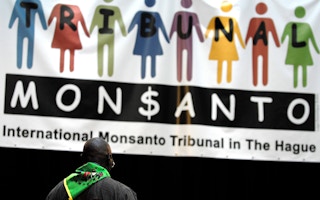As you peruse your supermarket, inundated with choice or thinking about your weekly shopping list, the last thing that springs to mind is where your food comes from. Whilst the easy answer is the farm or factory, it’s alarming to think that 10 companies – six agricultural giants and four global corporations - control the world’s food systems.
One of the most prominent giants, Monsanto sells products that undermine the necessary transition to ecological farming and instead pushes for the use of toxic agrochemical and genetically engineered (GE) seeds that reinforce big corporate control over farmers and the food system. Furthermore, Monsanto is currently undergoing a merger with another titan, Bayer, thus increasing their grip over our food system.
Behind this deal and others made by agribusiness, there are soils drained of nutrients, poisoned waterways, unsustainable production practices - and it’s all going into our bodies. In 2016, a Greenpeace Japan social experiment showed that switching people’s diet from conventional to organic food significantly reduced the pesticide levels in their urine.
That’s why farmers, scientists and activists from all over the world gathered at the Monsanto Tribunal in the Hague, Netherlands, last year to present the case - albeit a people’s one - against destruction caused by one of the corporate giants that promotes industrial farming.
In October 2016, communities around the world who have suffered from the corporation’s approach to agriculture aimed to hold Monsanto to account for its alleged atrocities against humanity and the environment. Six detailed questions were submitted to the Tribunal and they constitute its terms of reference: the right to a healthy environment, the right to food, the right to health, freedom of scientific research, complicity in war crimes, and ecocide.
Then, earlier this month, the communities reconvened and the recommendation was made, in which its impact is a small step towards reclaiming food and farming from corporate control.
In an opinion handed down by real, internationally eminent and independent judges presiding the case, they stated that:
“…The impacts of Monsanto’s conduct on biodiversity have also negatively affected the rights of indigenous peoples and local communities. These impacts are all the more grave, given the close dependency of indigenous peoples and local communities on the environment. The lack of adequate information on risks posed by herbicides and GMOs and the lack of adequate mitigation measures, the lack of credible environmental impact assessments, and the lack of meaningful consultations; they all further underscore Monsanto’s interference with human rights…”
“Today’s dominant agro-industrial model is highly problematic, not only because it is dependent on dangerous chemicals, but also due to its negative effects on climate change, its impact on the loss of biodiversity, and its inability to ensure food sovereignty.”
Our food, our future
Though the Tribunal is an initiative without a legal basis the opinions came from real and independent judges. While we are waiting to see how the legal opinion will shape the food battle worldwide, the people’s movement is growing to protect citizens and the environment from toxic pesticides.
In Europe, more than 600,000 citizens have already supported a European Citizens Initiative to ban Glyphosate, the most used weed-killer globally and the main ingredient of Monsanto’s Roundup, classified by the WHO as potentially carcinogenic.
“
Today’s dominant agro-industrial model is highly problematic, not only because it is dependent on dangerous chemicals, but also due to its negative effects on climate change, its impact on the loss of biodiversity, and its inability to ensure food sovereignty.
Opinion of judges, Monsanto Tribunal
Over in Thailand, civil society organisations have successfully pressured their government to ban two major toxic chemicals - paraquat and chlorpyrifos, a herbicide and an insecticide accordingly.
And in the US, over 300 food and farm groups signed an open letter to ask the Department of Justice to oppose the mega mergers happening in agriculture. Similarly, more than 200 organisations have signed open letter to the European Commission on agri-business mergers.
Whilst the growth of local, slow or organic food movements are growing around the world, it’s continual pressure on governments, the further spreading of information, and people power that’s going to give the food system we want and are truly going to expose gaps and systemic failure in corporate accountability.
After all, this doesn’t just affect farmers but every single one of us. It is our food, our future.
Angelica Pago is a Media Campaigner at Greenpeace Southeast Asia, and Watcharapol Daengsubha is a Food and Ecological Agriculture Campaigner at Greenpeace Southeast Asia. This post has been exclusively written for Eco-Business.











